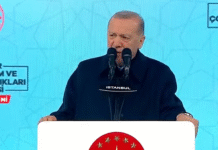A Turkish journalist and media executive has been behind bars for 301 days in Turkey over his subscription to a critical newspaper that was published by the media group he had worked for.
Muhammed Büyükçıngıl, 34-year-old network executive is now facing up to 22 years in jail if he gets convicted on the account that he was the subscriber of Zaman newspaper, one-time the largest daily in Turkey before the government seized it on March 4, 2016 and later shut it down in July 2016. Büyükçıngıl worked as deputy general manager of Irmak TV, a broadcasting network that featured mostly cultural shows. The network was owned by Feza Publishing, a media outlet that also published Zaman, among other publications.

Government-appointed trustees who took over the network in March immediately fired Büyükçıngıl in order to turn it into a government mouthpiece. He could not find a job in the industry that he knew well because of reluctance by most companies to hire anybody who had worked in a critical media outlet in the past. His wife Pınar Büyükçıngıl, a kindergarten teacher at a public school, kept supporting the family in the meantime.
The worse came when his wife was also dismissed from her job along with more than a hundred thousand by government decrees, known as KHK in Turkish, on charges of terrorisms without any administrative or judicial probes.
The Büyükçıngıl couple who could not afford living expenses in İstanbul, Turkey’s largest city, decided to move to their parent’s village in his hometown Kahramanmaraş, a province in the south of Turkey. Their saga was far from over however as the worst is yet to come. The police raided Büyükçıngıl’s parent house on January 6, 2017 at 5 am in the morning and detained him on the spot.
The journalist was transferred to İstanbul and thrown into a detention cell at the İstanbul Police Department on Vatan Street where he had stayed 26 days before seeing a judge and attorney. He was subjected to physical ill-treatment and psychological abuse by the police. He was formally arrested on dubious terror charges and jailed in İstanbul’s notorious Silivri Prison on February 2, 2017.
In the indictment, the prosecutor presented Büyükçıngıl’s subscription to Zaman daily as evidence of terrorism crime. In a bizarre and twisted logic, he was accused of buying a newspaper published by a corporate entity he had worked.
Another scandalous accusation brought against Büyükçıngıl by the prosecutor is that his cancellation of the subscription to Digiturk, a cable TV network, in protest of Digiturk’s removing a number of critical TV channels including Irmak TV from its line-ups late in 2015. Thousands of citizens, as well as many lawmakers from opposition parties joined the nationwide boycott campaign against the pro-government cable company that was trying to curtail the reach of critical TVs to audience.
Another purported evidence in the indictment is his deposits at Bank Asya that is affiliated with the Gülen movement which was one of the three banks with the highest liquidity in Turkey. The government unlawfully took over the bank on February 4, 2015, contrary to strict statutory banking regulations against such a drastic move.
Büyükçıngıl appeared before judges for the first time on October 3, 2017. He rejected all accusations brought against him. He asked the court what evidence in the indictment that actually proved his crime under anti-terror laws.
Each defendant was given only three minutes for their testimony in the court. One of the victims at the same hearing objected this time limit by saying that “I am behind bars for 15 months, please let us testify 15 minutes at the very least.” All of a sudden, the judge who was the head of the panel turned his back on suspects as a gesture that he did not care what they would tell.
As expected, the court ruled the continuation of Büyükçıngıl’s arrest. The next hearing will be held on December 22, 2017.
Büyükçıngıl was born in Kahramanmaraş in 1983. He graduated from the Faculty for Computer and Control Technologies at İstanbul’s prestigious Marmara University in 2006. He worked at various software companies for 5 years until he got an offer from newly established Cihan Radio that was seeking a talented manager.
Cihan Radio became one of the most popular stations that feature cultural programs under the management of Büyükçıngıl. He had received many national awards. In 2013, Büyükçıngıl was appointed as deputy general manager for Irmak TV that was established that year. He became father in the same year when his wife gave a birth to baby boy named Burak.
Known for his positive energy, geniality and modesty by his colleagues, Büyükçıngıl was a well-respected figure in the media sector and among his friends. He is now awaits in his cell for the next hearing with the hope that the judges will decide to release him this time around.
Turkey is the biggest jailer of journalists in the world. The most recent figures documented by the SCF has showed that 254 journalists and media workers are in jails as of October 30, 2017, most in pre-trial detention languishing in notorious Turkish prisons without even a conviction. Of those in Turkish prisons, 230 are arrested pending trial, only 24 journalists remain convicted and serving time in Turkish prisons. An outstanding detention warrants remain for 133 journalists who live in exile or remain at large in Turkey.
Detaining tens of thousands of people over alleged links to the Gülen movement, the government also closed down more than 180 media outlets after the controversial coup attempt.
Turkey survived a controversial military coup attempt on July 15, 2016 that killed 249 people. Immediately after the putsch, the Justice and Development Party (AKP) government along with President Erdoğan pinned the blame on the Gülen movement.
Gülen, who inspired the movement, strongly denied having any role in the failed coup and called for an international investigation into it, but President Erdoğan — calling the coup attempt “a gift from God” — and the government initiated a widespread purge aimed at cleansing sympathizers of the movement from within state institutions, dehumanizing its popular figures and putting them in custody.
Turkey has suspended or dismissed more than 150,000 judges, teachers, police and civil servants since July 15. Turkey’s Justice Ministry announced on July 13 that 50,510 people have been arrested and 169,013 have been the subject of legal proceedings on coup charges since the failed coup.















